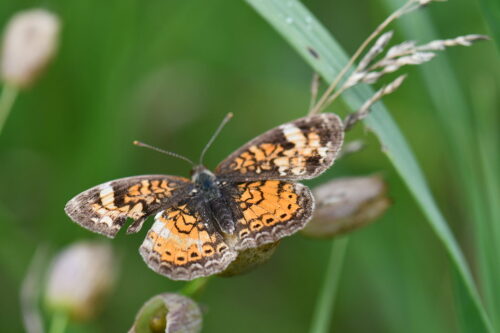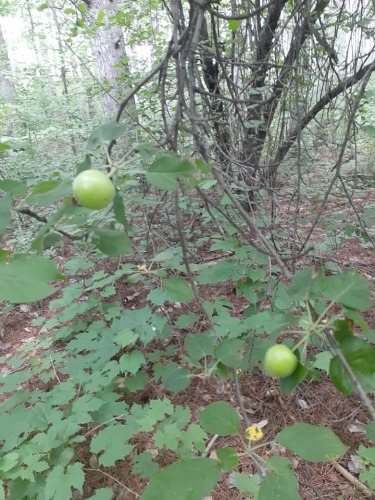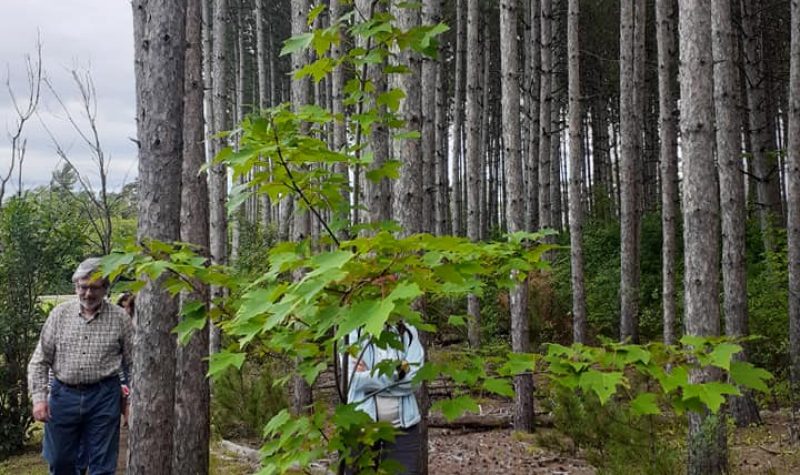A group of local environmental activists has been protesting a controversial development in the city’s south end since the spring, and they say they're not giving up any time soon.
Otto’s BMW, a high-end auto dealership, made an application last May to construct an additional parking lot and storage shed on the land adjacent to their Hunt Club facility, which is owned by the Ottawa Airport Authority. As the land is zoned for commercial use, which doesn’t permit the construction of the parking lot or storage shed being proposed, Otto’s BMW also needed to submit a zoning bylaw amendment application.
The proposed development would clear approximately 1.57 hectares of red pine forest, originally a plantation, which has been there for the better part of a century.
Since May, a group called Save Hunt Club Forest and members of the surrounding community have been fighting to keep the red pine plantation from being destroyed.
In August, after facing significant pressure from community members, Otto’s BMW paused their development application.
However, Save Hunt Club Forest member Carolyn Ewers says the community is still in danger of losing the forest. Even if Otto’s BMW withdraws their application, the land may be leased to another buyer.
“Otto’s BMW is involved because they were going to lease the land,” says Ewers. “It's right next to their property. Their application is still with the City of Ottawa, but they have paused it… We know for a fact that the Airport Authority is going to lease the land to the next people that come along. So the forest is still not safe.”

There have been over 30 unique species of animal, insect, and bird identified by members of Save Hunt Club Forest. Photo by Carolyn Ewers.
Ewers says the group has now shifted its focus to put pressure on the Ottawa Airport Authority. She says the group has made attempts to contact the Airport Authority, but they have not been able to arrange a meeting.
She points out that airports, a major producer of carbon emissions, should take more responsibility for the land they occupy.
“We're declaring a climate crisis, right now is not the time to cut down trees, especially mature trees,” says Ewers. “The trees are… 50 to 60 years old, they're taking a lot of CO²… out of the air. And I feel like they can't be replaced, even if you plant a new forest is never going to replace the amount of carbon dioxide that those trees are removing from our environment. So I think it should be very important to them to not cut down trees.”
Prior to the development application being submitted, environmental assessment company McKinley Environmental Solutions conducted a survey of the red pine plantation. The company’s environmental impact statement indicated that the red pine plantation “is not considered an ecologically significant feature,” and that there were no significant species or landscape features at risk. The assessment also estimated the red pine trees to be about 55 years old.
According to Ottawa’s Official Plan, an “Urban Significant Woodland” is defined as any wooded area within the city that is at least 60 years old and 0.8 hectares in size.
Members of Save Hunt Club Forest have since been conducting their own survey, documenting the range of biodiversity in the area. By gauging the rate of growth from a picture taken of the area in 1965, the group estimates the trees are at least 60 years old.
Ewers says the McKinley assessment was conducted during the winter, and didn’t take into account the degree to which the natural landscape comes to life during warmer months.
“So we don't think that was the best time of the year to really do an assessment because… all the summer we've been there every day, and there's tons of undergrowth,” says Ewers. We went in there with a couple of foresters and naturalists, and theified like 100 different varieties of plants and trees that are growing in the forest. So we know that this forest has a lot of potential to be (a) wonderful mixed forest, even though it is predominantly red pines right now.”
The red pine plantation is now home to over 90 different varieties of plant and tree and over 30 different species of animal, bird, and insect. The group’s survey is still ongoing, so there may be more types of plants and animals in the area which have yet to be documented.
According to Ewers, the area is widely enjoyed by community members.

There have been over 90 species of trees and plants recorded by the Save Hunt Club Forest group. Photo by Carolyn Ewers.
Michael Vorobej is a community member who attends the Save Hunt Club Forest protests six days a week. He has lived in the region for most of his life, and says he understands what the forest means to community members.
“Those trees have always been a landmark on Hunt Club Road,” says Vorobej. “More specifically, our community uses it, kids play in there, they go round on their bikes, people walk their dogs there, people just go birdwatching there, or go for a walk to get some fresh air. So we use it every day.”
Vorobej has communicated the group’s concerns with local policy-makers, but they need the attention of federal members of parliament such as David McGuinty of Ottawa South.
“So we've been told by our city councilor that there's a limit to what the city can control in terms of activities on that land,” says Vorobej. “Ultimately, the airport could come in anytime and simply cut down every tree, if they felt like it, because it's federal land under their control. So we've focused our campaign both at the municipal level to stop the immediate zoning issues, but also very, very much on the federal level.”
Councillor Riley Brockington offered his thoughts on the matter, saying that while he doesn’t think the city should cut down more trees during a climate crisis, the issue largely comes down to money.
“I've spoken with the local member, David McGuinty, and he's well aware of the concerns that this group has raised,” says Brockington. “And really pressure needs to be put on the Ottawa Airport Authority. They've… financially struggled, particularly during COVID, but they have a very large amount of land. The majority is dedicated towards airport purposes or preserving an airport but they also have surrounding land that they're trying to develop and bring in [other] revenues. They're trying to diversify their revenue sources, particularly as you've seen with [how] COVID decimates the travel and hospitality industry.”
Brockington added that he has heard from the Ottawa Airport Authority and Otto’s BMW that they are looking into alternate placements for the proposed development.
CHUO reached out to Otto’s BMW and the Ottawa Airport Authority, but they were not available for comment before this story was aired.
Save Hunt Club Forest is asking anyone who wishes to become involved to visit their website, attend protests, and sign their petition, which has obtained nearly 20,000 signatures.
Listen to the CHUO story below:


